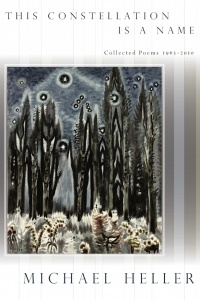Book Review
Every poem worth reading clears its own space in the imagination of the reader, its own verbally constructed mise en scène—whether the “lone and level sands” of Shelley’s “Ozymandias,” the nightmare seascapes of Coleridge’s “Mariner,” or the rather claustrophobic seventeenth-century dumbshows in which I’ve always mentally staged George Herbert’s spiritual dialogues. Some poems, however, are more closely bound to particular places, particular terrestrial landscapes: Yeats’s evocations of Ireland, Bunting’s “Briggflatts,” Rukeyser’s Book of the Dead. Michael Heller’s poems, now available in their imposing entirety in This Constellation Is a Name, more often than not take place in both a figurative and a literal sense, for Heller brings a traveler’s—not a tourist’s, mind you—keen observing sensibility to bear on everything around him.
There are a lot of poems about literal travel here—Spain, France, England, the Far East—and a number of “vacation poems” (the Hamptons, Colorado), but Heller’s most familiar stomping grounds as a poet are the streets and neighborhoods of New York City, where he has lived his entire adult life, and the subtropical surrealism of Miami Beach, where he lived as a child (as recalled in his affecting 2000 memoir Living Root). These cityscapes—“builded places,” to echo the title of Heller’s collection In the Builded Place—are rich sites both of present experience and of layered memory, personal and historical.
Heller’s early experiences of poetry were in the company of friends working as technical writers in New York, and through them (Hugh Seidman in particular) he came to know the work of Louis Zukofsky and the other “Objectivist” poets: those laureates of observation left him “convinced of a common / / clarity.” Zukofsky’s spare, angular lines have made a mark on Heller’s language, but far more lasting has been his meditation on the works of George Oppen, whose own difficult idiom is at the service of a fundamentally ethical vision of the poem. For Heller, as for Oppen (and for that matter, Paul Celan, who said, “I cannot see any basic difference between a handshake and a poem”), the poem is always a matter of communication, of one person reaching out to another. “I suspect,” Heller writes in “At Albert’s Landing,” “that mine is a poetry of clouds,” perhaps no more than a notation of the passing phenomena of the world. The woods through which he and his son walk is “no paradise,” “Just the real,” but,
Things lean and lean, and sometimes
Words find common centers in us
Resonating and filling speech.
Let me know a little of you.
The tension underlying all of Heller’s poetry is between the poem as communication, as spoken address, and the poem as autonomous artifact, sonorous but self-referential verbal object (perhaps, in Mallarmé’s words, “Aboli bibelot d’inanité sonore”—abolished tchochke of sonorous emptiness). In “Fifty-three Rue Notre-Dame de Nazareth,” Heller admits to being “another legatee of Mallarmé,” having “played with the exclusionary pun,” “strained against the tongue / Until the word displaced / The world’s foreign body.” And in “To Postmodernity,” he observes how “Some of the poets”—Mallarmé’s more intransigent avant-garde heirs—are “anxious to disconnect / the dots and words,” to expose “by luxuriant asides” “our non-being / and the certain emptiness of death, / the passivity needed to survive / the modern . . .” All very well, Heller grants—
And yet love’s obliquity
is still a language,
a tutory mastery of desires
and hurts, leaps and kneelings
at the utterance of a name.
Like a self-assured Philippe Petit, Heller’s poetry walks (and often dances) a tightrope suspended between linguistic play and felt experience. “Experience,” however, is for Heller far more than just the individual’s ongoing narrative (though he writes very affectingly of his love for his wife and his memories of his family): it includes the rich cultural humus of every place he visits, the resounding historical echoes inhabiting the most seemingly insignificant made object. If Heller’s New York is the New York of his uncle Nat and grandfather Zalman, it is also the New York of Walt Whitman and Edgar Allen Poe; his Paris is stalked by the presences of Baudelaire and Walter Benjamin, among whom he is a kindred flâneur.
I’ve always thought of Heller as a thrifty poet, chary both of his words and of his publications: a poem here, a poem there, a substantial collection every decade or so. But behold! With This Constellation Is a Name, one suddenly realizes that Heller, over the last forty-five years, has been building a more than impressive life’s work—an oeuvre, as it were. To the central collections Accidental Center (1972), Knowledge (1979), In the Builded Place (1989), and Eschaton (2009), This Constellation adds gatherings of poems from the very beginning of Heller’s career, “new” poems included in his two earlier selected volumes, and poems accreted over the past half decade. It all adds up to some 550 pages of cunningly crafted, impressively varied, always assured, and very often deeply moving verse, a shining testament to the vocation Heller recalls in “Logobiography”:
Letter will lead to letter.
This you knew when first
you spelled a word.
…
This you knew.
Hearing a poem,
you knew this.
Those days—casting words about
until a line promised
to echo nothing
that you’d heard
And then, this you felt:
to make such a life
had been required of you
when first you heard a word.
About the Reviewer
Mark Scroggins’s most recent books of poetry are Torture Garden: Naked City Pastorelles (The Cultural Society, 2011) and Red Arcadia (Shearsman, 2012). The Poem of a Life: A Biography of Louis Zukofsky was published by Shoemaker & Hoard in 2007.
